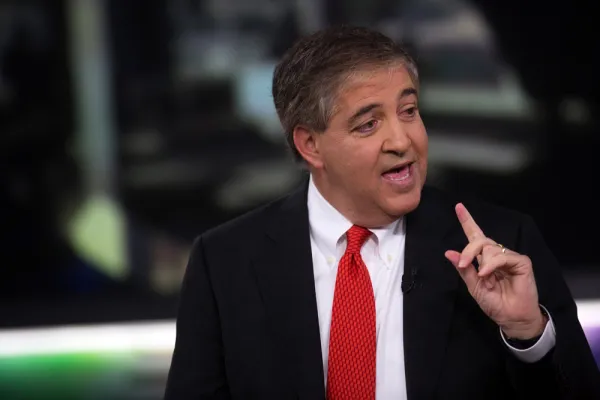The hedge fund sports owner hex strikes again.
The latest victim: Harbinger Capital Partners’ Philip Falcone. Last week the minority owner of the Minnesota Wild ice hockey team agreed to settle civil charges with regulators, which will result in the Minnesota native winding down his hedge funds.
Falcone thus becomes at least the third hedge fund manager in the past few weeks who either owns or has made a bid to buy a professional sports team who has suffered a big setback in his day job. He joins Jeffrey Vinik of Vinik Asset Management, who recently announced he is shutting his hedge funds to devote his time to running the Tampa Bay Lightning hockey team, and Valiant Capital Management’s Christopher Hansen, whose losing streak at his hedge fund roughly tracks his negotiations to buy the Sacramento Kings basketball team.
For Falcone, this week’s news marked an astounding fall from grace. Falcone was among a handful of managers who became billionaires from betting against subprime mortgages, having personally made $1.7 billion in 2007 and qualifying for the Institutional Investor’s Alpha Rich List ranking for the first time that year. Losses stemming in part from an ill-fated dream to build a 4G telecommunications network contributed to Falcone’s recent failures as his firm’s hedge fund assets shrank 90 percent from a high of $20 billion.
The Securities and Exchange Commission’s cases alleged that Falcone manipulated the junk bond market and allowed a few favored clients to redeem when his firm wasn’t permitting other clients to take out their money. The SEC also admonished Falcone for personally borrowing money from his hedge funds. It is not clear what he — or the National Hockey League — plans to do about his investment in the team.
Meanwhile, earlier this month, Jeff Vinik, the majority owner of the NHL’s Tampa Bay Lightning, announced plans to shutter his hedge fund firm after suffering losses since a new investment team was brought in last fall. Vinik — who also owns a minority stake in the Boston Red Sox baseball team — plans to run the Lightning full-time, according to published reports. He has a big challenge there as well, given that the team failed to qualify for the Stanley Cup playoffs for the second straight year.
We have also recently chronicled the woes of Valiant Capital’s Hansen. Since negotiations to eventually make an offer to buy the Sacramento Kings basketball team and move it to his native Seattle heated up last fall, his once high-flying hedge fund has suffered. The fund has lost money in each of the past seven months at the same time that the overall stock market has been surging.
The Tiger Cub – so called because he is one of several managers to have worked for Julian Robertson’s Tiger Management – recently suffered a major setback when the National Basketball Association’s relocation committee voted unanimously against permitting the team to move. Meanwhile, the Sacramento Bee reported that the group offering to buy the team and keep it in Sacramento recently met its deadline to put 50 percent of the purchase price into escrow. The NBA’s board of governors could vote on the fate of the team as early as this week.
John Henry’s commodity trading advisory firm, John W. Henry & Co., has also suffered ever since Henry bought controlling interest in the Boston Red Sox. This culminated late last year, when Henry decided to shut it down altogether and return the meager $100 million of outside money left in the fund. That amount was down from $2.5 billion in 2004, which also happened to be the year the Red Sox (ooh, it kills me to type this) won the World Series.
Henry told the Boston Globe at the time in an e-mail message: “I haven’t run the company since 1989. We’ve always had a mathematical approach and a philosophy that hasn’t changed.” Of course, the average CTA has lost money in each of the past two years, according to Chicago-based industry tracker Hedge Fund Research, so perhaps investors can’t blame the Sox for Henry’s performance.
Then there is the case of Jeffrey Gendell of Tontine Associates. A former partner at Odyssey Partners, the legendary hedge fund firm founded by Leon Levy and Jack Nash, Gendell is a minority owner of his hometown Cincinnati Reds baseball team. He was a rising star in the 1990s and 2000s, racking up triple-digit gains in 2003 and 2005 in part from homebuilding stocks and very small S&Ls. However, he crashed in 2008, when most of his funds lost between 65 percent and 75 percent and another of his funds — Tontine Partners LP — reportedly lost 91.5 percent. Gendell blamed the combination of falling commodity prices, massive anticipated hedge fund redemptions and the seizing up of the credit markets for his nightmare year in 2008 in a letter to investors in October 2008.
However, writings in his client letters during that year indicated Gendell was also guilty of not grasping the magnitude of the crisis at the major financial institutions that summer and wrongly betting that the market had bottomed in late September, after Lehman Brothers Holdings filed for bankruptcy. He also was hurt by large holdings in small, illiquid stocks in which he took large stakes. Until then Gendell qualified for the Rich List for the first six years of the ranking of the 25 highest-earning hedge fund managers.
Not all hedge fund honchos who own pieces of sports team have suffered setbacks in their day jobs, though. Those who are still thriving as investors include Appaloosa Management’s David Tepper, who owns a big chunk of the Pittsburgh Steelers; Baupost Group’s Seth Klarman, who owns a portion of the Boston Red Sox; Discovery Capital Management’s Robert Citrone, who recently made an investment in the Steelers; SAC Capital Advisors’ Steven Cohen, who recently invested $20 million in the New York Mets baseball team; and Avenue Capital Group’s Marc Lasry, a minority owner of the Brooklyn Nets basketball team.
However, Cohen and Lasry have been suffering from other setbacks. Cohen is desperately trying to hold on to his clients in the face of government scrutiny of the manager and his hedge fund firm. Lasry recently decided not to pursue an ambassadorship to France that he was very excited about. Lasry claims it was for business reasons. Published reports have linked him to members of a high-stakes poker game who are being investigated by the government.
Then there is Greenlight Capital’s David Einhorn, who had the opposite experience. He failed to buy a significant stake in the New York Mets, an investment that might have morphed into a controlling stake under certain circumstances. Given his peers’ recent experiences, he is probably relieved.






